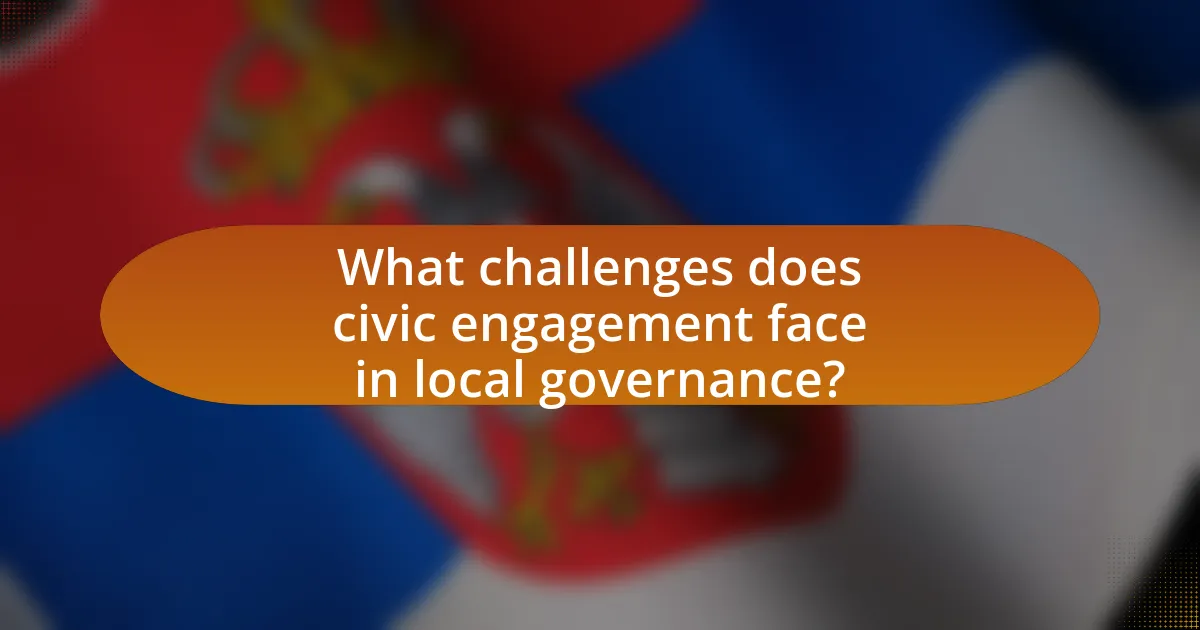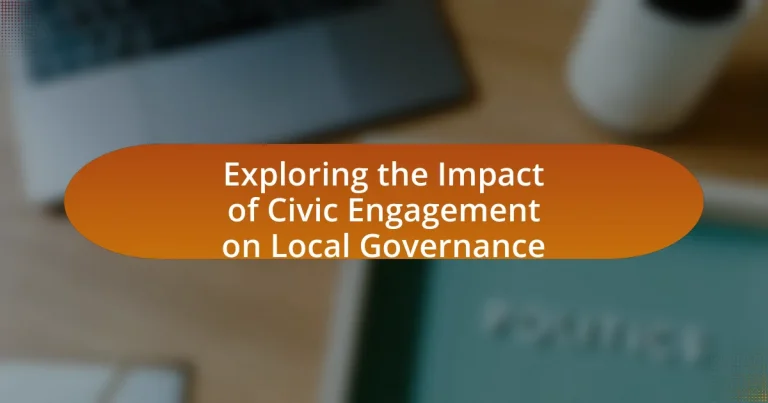Civic engagement is a vital component of local governance, significantly enhancing community participation in decision-making processes. This article explores the role of civic engagement in fostering transparency, accountability, and responsiveness among local authorities, highlighting its influence on policy outcomes and community development. Key mechanisms through which civic engagement impacts governance include increased public participation, improved policy responsiveness, and the shaping of citizen inputs into effective policies. The article also addresses challenges faced by civic engagement, such as socio-economic barriers and political apathy, while discussing the importance of technology and education in promoting active citizen involvement.

What is the role of civic engagement in local governance?
Civic engagement plays a crucial role in local governance by fostering community participation in decision-making processes. This involvement enhances transparency, accountability, and responsiveness of local authorities to the needs of residents. Studies show that when citizens actively engage, such as through public forums or local councils, they contribute to more informed policy-making and improved public services. For instance, research by the National Civic League indicates that communities with higher levels of civic engagement experience better outcomes in areas like education and public safety, demonstrating the tangible benefits of citizen involvement in governance.
How does civic engagement influence decision-making processes?
Civic engagement significantly influences decision-making processes by fostering greater public participation and accountability in governance. When citizens actively engage in civic activities, such as attending town hall meetings or participating in community forums, they provide valuable input that can shape policies and initiatives. Research indicates that communities with higher levels of civic engagement often experience more responsive and effective governance, as elected officials are more likely to consider the needs and preferences of an involved electorate. For instance, a study by the National Civic League found that cities with robust civic engagement initiatives saw a 20% increase in citizen satisfaction with local government services, demonstrating a direct correlation between civic involvement and improved decision-making outcomes.
What are the key mechanisms through which civic engagement impacts governance?
Civic engagement impacts governance primarily through enhanced accountability, increased public participation, and improved policy responsiveness. Enhanced accountability occurs when citizens actively monitor government actions, leading to greater transparency and reduced corruption. For instance, studies show that communities with active civic groups report higher levels of government accountability and lower instances of malfeasance. Increased public participation allows citizens to voice their needs and preferences, which can shape policy decisions. Research indicates that local governments that engage citizens in decision-making processes tend to create policies that better reflect community interests. Lastly, improved policy responsiveness is evident when civic engagement leads to quicker and more effective government responses to social issues, as seen in various participatory budgeting initiatives that have resulted in more targeted resource allocation.
How do citizen inputs shape policy outcomes?
Citizen inputs shape policy outcomes by providing essential feedback and perspectives that inform decision-making processes. When citizens engage through public consultations, surveys, or advocacy, they highlight community needs and priorities, which policymakers can then address. For instance, studies show that municipalities that actively solicit citizen feedback often see higher satisfaction rates and more effective policies, as evidenced by the 2018 report from the National League of Cities, which found that cities with robust citizen engagement practices experienced improved service delivery and community trust. This direct involvement ensures that policies reflect the values and concerns of the population, ultimately leading to more responsive and accountable governance.
Why is civic engagement important for community development?
Civic engagement is crucial for community development because it fosters active participation and collaboration among residents, leading to more effective governance and improved public services. When community members engage in decision-making processes, they contribute diverse perspectives that enhance the quality of policies and initiatives. Research indicates that communities with higher levels of civic engagement experience better social cohesion, increased trust in local institutions, and more responsive governance, as evidenced by a study from the National Civic League, which found that engaged communities are more likely to achieve positive outcomes in areas such as education, health, and economic development.
What are the social benefits of increased civic participation?
Increased civic participation leads to stronger community ties and enhanced social cohesion. When individuals engage in civic activities, they foster relationships and networks that contribute to a sense of belonging and mutual support. Research indicates that communities with higher levels of civic engagement experience lower crime rates and improved public safety, as residents are more likely to collaborate on local issues. Additionally, civic participation encourages diverse perspectives in decision-making processes, resulting in policies that better reflect the needs of the community. Studies show that areas with active civic involvement often see increased voter turnout and greater trust in local government, which further strengthens democratic processes and community resilience.
How does civic engagement foster trust between citizens and local authorities?
Civic engagement fosters trust between citizens and local authorities by promoting transparency and accountability in governance. When citizens actively participate in decision-making processes, such as town hall meetings or community forums, they gain insight into the actions and motivations of local authorities. This involvement allows citizens to voice their concerns and contribute to policy discussions, which enhances the perception that local authorities are responsive to community needs. Research indicates that communities with higher levels of civic engagement report greater trust in local government, as evidenced by a study from the National Civic League, which found that engaged citizens are more likely to believe that their local government acts in the public interest.

What challenges does civic engagement face in local governance?
Civic engagement in local governance faces challenges such as limited public awareness, lack of resources, and systemic barriers. Limited public awareness often results in low participation rates, as many citizens are unaware of local governance processes or how to engage effectively. Additionally, local governments frequently lack the resources necessary to facilitate meaningful civic engagement, including funding for outreach programs and staff dedicated to community involvement. Systemic barriers, such as bureaucratic red tape and political apathy, further hinder effective participation, making it difficult for citizens to influence decision-making processes. These challenges collectively diminish the potential for robust civic engagement, ultimately impacting the quality of local governance.
How do socio-economic factors affect civic participation?
Socio-economic factors significantly influence civic participation by determining individuals’ access to resources, education, and social networks. Higher income levels often correlate with increased civic engagement, as wealthier individuals typically have more time and financial resources to participate in community activities and political processes. For instance, a study by the Pew Research Center found that individuals with higher education levels are more likely to vote and engage in civic activities, highlighting the role of education as a socio-economic factor. Additionally, socio-economic status affects individuals’ perceptions of their ability to influence governance, with those in lower socio-economic brackets often feeling disenfranchised and less likely to participate. This relationship underscores the importance of addressing socio-economic disparities to enhance civic engagement across diverse communities.
What barriers prevent marginalized communities from engaging in governance?
Marginalized communities face several barriers that prevent their engagement in governance, including systemic discrimination, lack of access to resources, and inadequate representation. Systemic discrimination manifests through policies and practices that disproportionately disadvantage these communities, limiting their ability to participate in decision-making processes. Lack of access to resources, such as education, information, and financial support, further hinders their ability to engage effectively. Additionally, inadequate representation in political structures means that their voices and concerns are often overlooked, perpetuating a cycle of disenfranchisement. Studies have shown that these barriers contribute to lower levels of civic participation among marginalized groups, reinforcing existing inequalities in governance.
How does political apathy influence civic engagement levels?
Political apathy significantly reduces civic engagement levels by leading individuals to disengage from political processes and community activities. When citizens feel indifferent or disillusioned about politics, they are less likely to participate in voting, attend town hall meetings, or engage in local governance initiatives. Research indicates that in communities with high levels of political apathy, voter turnout can drop below 50%, as seen in the 2014 U.S. midterm elections, where only 36.4% of eligible voters participated. This disengagement undermines democratic processes and weakens community ties, ultimately affecting the effectiveness of local governance.
What role does technology play in enhancing civic engagement?
Technology significantly enhances civic engagement by providing platforms for communication, information sharing, and participation in governance. Digital tools such as social media, mobile applications, and online forums facilitate real-time interaction between citizens and government entities, allowing for greater transparency and accountability. For instance, a study by the Pew Research Center found that 69% of adults in the U.S. use social media, which serves as a vital channel for civic discourse and mobilization during elections and community initiatives. Additionally, online petitions and crowdsourcing platforms empower citizens to influence policy decisions directly, demonstrating technology’s role in fostering active participation in local governance.
How can digital platforms facilitate citizen involvement in local governance?
Digital platforms can facilitate citizen involvement in local governance by providing accessible channels for communication, feedback, and participation in decision-making processes. These platforms enable citizens to engage with local officials, share their opinions on community issues, and participate in discussions through tools like online forums, surveys, and social media. For instance, a study by the Pew Research Center found that 70% of Americans believe that social media can enhance civic engagement by allowing citizens to express their views and connect with others on local governance matters. Additionally, platforms like Nextdoor and local government websites have been shown to increase transparency and accountability, as they allow residents to report issues and track the progress of local initiatives.
What are the risks associated with online civic engagement?
The risks associated with online civic engagement include misinformation, privacy concerns, and digital divide issues. Misinformation can spread rapidly on social media platforms, leading to misinformed public opinions and decisions, as evidenced by studies showing that false information can reach a wider audience than factual content. Privacy concerns arise from the collection and misuse of personal data by platforms, which can deter individuals from participating in civic discussions. Additionally, the digital divide creates disparities in access to online platforms, leaving marginalized communities underrepresented in civic engagement efforts. These risks highlight the complexities of fostering effective online civic participation.

What are effective strategies for promoting civic engagement in local governance?
Effective strategies for promoting civic engagement in local governance include fostering community participation through accessible public forums, utilizing technology for outreach, and implementing educational programs about civic responsibilities. Community participation can be enhanced by organizing regular town hall meetings, which allow residents to voice concerns and contribute to decision-making processes. Research indicates that municipalities that actively engage citizens in governance see increased trust and collaboration, as evidenced by a study from the National Civic League, which found that cities with strong civic engagement initiatives report higher levels of community satisfaction and involvement. Additionally, leveraging technology, such as social media platforms and mobile applications, can facilitate communication between local governments and residents, making it easier for citizens to access information and participate in governance. Educational programs that inform citizens about their rights and responsibilities can further empower individuals to engage actively in local governance, leading to more informed and involved communities.
How can local governments encourage citizen participation?
Local governments can encourage citizen participation by implementing inclusive outreach programs and facilitating accessible communication channels. For instance, local governments can host community forums and workshops that invite residents to share their opinions and ideas on local issues, thereby fostering a sense of ownership and involvement in governance. Research indicates that municipalities that actively engage citizens through participatory budgeting processes see increased public interest and involvement, as evidenced by a study from the World Bank, which found that participatory budgeting led to a 20% increase in citizen engagement in local decision-making. Additionally, utilizing digital platforms for surveys and feedback can enhance participation, as these tools allow for broader reach and convenience, particularly among younger demographics.
What initiatives have proven successful in increasing civic engagement?
Successful initiatives for increasing civic engagement include community organizing, participatory budgeting, and voter registration drives. Community organizing empowers residents to address local issues collectively, leading to increased participation in governance. Participatory budgeting allows citizens to directly influence budget decisions, fostering a sense of ownership and responsibility. Voter registration drives have been shown to significantly increase voter turnout; for example, the National Voter Registration Act of 1993 led to millions of new registrations. These initiatives demonstrate effective strategies for enhancing civic involvement and strengthening local governance.
How can education and outreach improve community involvement?
Education and outreach can significantly improve community involvement by increasing awareness and understanding of local issues and governance processes. When community members are educated about their rights, responsibilities, and the mechanisms of local governance, they are more likely to participate in civic activities such as voting, attending town hall meetings, and engaging in community projects. Research indicates that communities with robust educational outreach programs see higher levels of participation in civic activities; for example, a study by the National Civic League found that informed citizens are 50% more likely to engage in local governance initiatives. This correlation highlights the importance of education and outreach in fostering a more active and informed citizenry, ultimately leading to enhanced community involvement.
What best practices can be adopted for effective civic engagement?
Effective civic engagement can be achieved through practices such as fostering inclusive participation, utilizing technology for outreach, and providing education on civic processes. Inclusive participation ensures diverse community voices are heard, which enhances decision-making and reflects the community’s needs. For instance, research by the National Civic League indicates that communities with diverse engagement strategies see improved trust in local governance. Utilizing technology, such as social media platforms and online surveys, allows for broader outreach and real-time feedback, making civic engagement more accessible. Additionally, educating citizens about civic processes, as highlighted by the Center for Information & Research on Civic Learning and Engagement, empowers individuals to participate meaningfully, leading to more informed and active communities.
How can local governments measure the impact of civic engagement initiatives?
Local governments can measure the impact of civic engagement initiatives through quantitative metrics such as participation rates, surveys, and feedback mechanisms. For instance, tracking the number of participants in civic events or initiatives provides a clear indicator of community involvement. Additionally, conducting pre- and post-engagement surveys can assess changes in public perception and satisfaction regarding local governance. Research by the National Civic League indicates that communities with higher civic engagement report improved trust in government and increased civic participation, demonstrating a direct correlation between engagement initiatives and positive governance outcomes.
What role do partnerships with community organizations play in enhancing engagement?
Partnerships with community organizations play a crucial role in enhancing engagement by fostering trust and collaboration between local governance and residents. These partnerships enable local governments to tap into the knowledge and resources of community organizations, which often have established relationships with diverse populations. For instance, a study by the National League of Cities found that cities that actively engage with community organizations see a 30% increase in citizen participation in local governance initiatives. This increase is attributed to the organizations’ ability to mobilize community members, provide relevant information, and create inclusive platforms for dialogue, thereby strengthening civic engagement and improving governance outcomes.
What practical steps can citizens take to engage with local governance?
Citizens can engage with local governance by attending town hall meetings, which provide a platform for direct interaction with elected officials and discussion of community issues. Participation in these meetings allows citizens to voice concerns, ask questions, and influence local decision-making processes. Additionally, citizens can join local advocacy groups or community organizations that focus on specific issues, thereby amplifying their voices and fostering collective action. Volunteering for local boards or committees also enables citizens to contribute directly to governance and policy development. Research indicates that active civic engagement leads to improved community outcomes and greater accountability in local governance.


